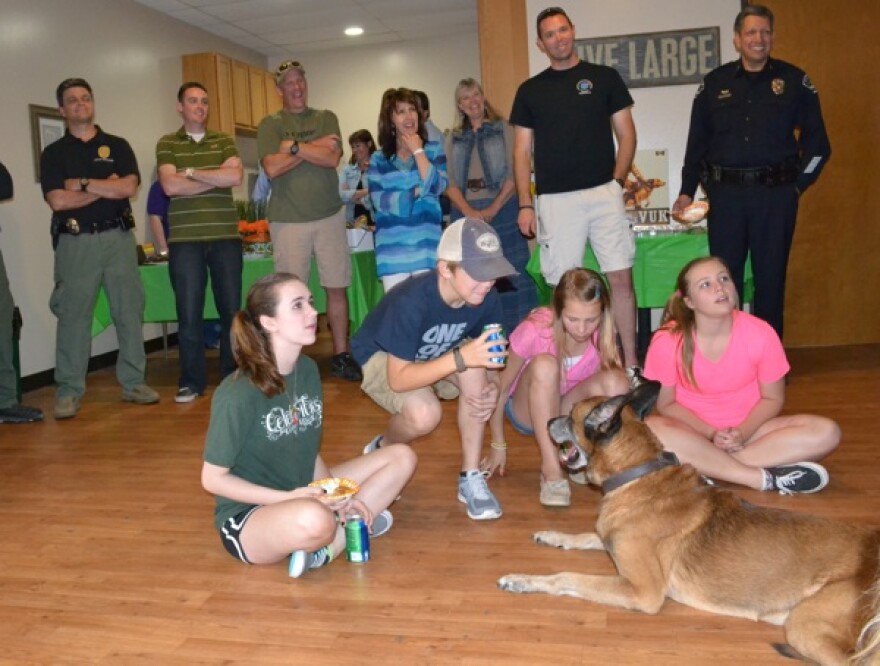After nearly seven years of service, 164 arrests, a handful of trips to the vet for stitches and one bout with a skunk, Vuk has hung up his harness.
Vuk—a Belgian Malinois canine commissioned by the Austin Police Department in 2006—celebrated his retirement Sunday at the Happy Tails Pet Resort in Cedar Park.
His handler, Officer Daniel Eveleth, shared stories of Vuk’s (pronounced VOOK) time in the police force. He joked that Vuk had a more impressive arrest record than he did and recalled some of his more, well, trying, days at work. Like the time he nose-dived into a field and returned with a skunk.
“The skunk let out a squeak and a squirt,” Eveleth said. As his reward, Eveleth found himself driving the 30 minutes home, his head wrapped in a towel with all windows open, and Vuk in the backseat happily unaware of his stench.
“My neighbors were having a yard sale and I’m in the front yard washing him in tomato juice,” he joked.
Stories like this could resonate with any dog owner, but Vuk is certainly no ordinary dog. Vuk has been involved in 164 arrests for the APD. His nose has ended countless searches and his presence has caused suspects to stop in their tracks. Basically, he’s provided all that APD Assistant Police Chief Raul Munguia called the greatest advantages of having K-9’s in the department.
“There have been times when we’ve been searching for a suspect for an hour and a half, then we release the canines and the search will end in five minutes,” Munguia said.
Dogs have among the keenest senses of smell in the animal kingdom, a trait that makes them invaluable to the police force. But Munguia also noted that K-9s are instrumental in preventing deadly-force encounters.
Vuk’s handler Daniel Eveleth, who has been an APD officer for sixteen years, agreed. “It’s rare that people contest an arrest once the dogs are involved,” he said. “Guns are pointed at them [a suspect] and all they can see is that dog.”
In fact, in 164 arrests, Vuk has bitten just five suspects. At the party, though, it was hard to imagine he has an aggressive side at all.
Vuk stayed on Eveleth’s leash throughout the ceremony, but was rarely without a band of children who vied for his attention. They sprawled across his lean and muscular body, patted his head and posed for photos. For his part, Vuk was preoccupied with a black chew toy, one of his many retirement presents.
“Vuk has always been the ambassador—well, I don’t want to say ambassador for the whole K-9 unit—but he’s always been the dog who’s been really good in public displays,” his handler said. “I can take him to the schools and have children pet him there and then I can turn around and take him to work and he turns on his work face.”
Eveleth acknowledged that Vuk has slowed with age, suffering from arthritis worsened by injuries in the field. Old age affects everyone that lives long enough, but service dogs face their own share of problems.
Sandra Brown of the Greater Austin Crime Commission (GACC) started the city’s 401k+9program to address the health needs of retired law enforcement dogs. It is the first such program to be established in the country.
Brown said that when service dogs retire, they no longer receive health care benefits from the state; those costs are paid by their owners, which could be $3,000 for a torn tendon or ongoing expenses for hydrotherapy, to name a few. It's a heavy burden for a handler to bear, Brown said.
“These guys are their partners and they work side by side for years, so it’s a really hard call whether to put them down or try to take on all the costs,” she said.
“Acting as patrol partners, in search and rescue, and in the detection of explosives, narcotics, and biological and chemical weapons, many of these dogs are injured and physically stressed for their entire lives,” GACC explains on its website. To remedy this is the 401k-9, a program dedicated to providing financial relief for dogs who have served for law enforcement agencies.
Brown is responsible for sustaining the program. GACC has received its funding from private donors and small businesses and has relied on networks of veterinarians and pharmaceuticals who offer reduced-costs services.
Vuk, who officially retired in late 2012, has since undergone therapy for his tired limbs, but Eveleth said he hasn’t completely ended his activities.
“Occasionally I’ll still take him outside and let him play with the bite sleeve, he still loves the bite sleeve,” he said. “It’s like a big toy to him.”

